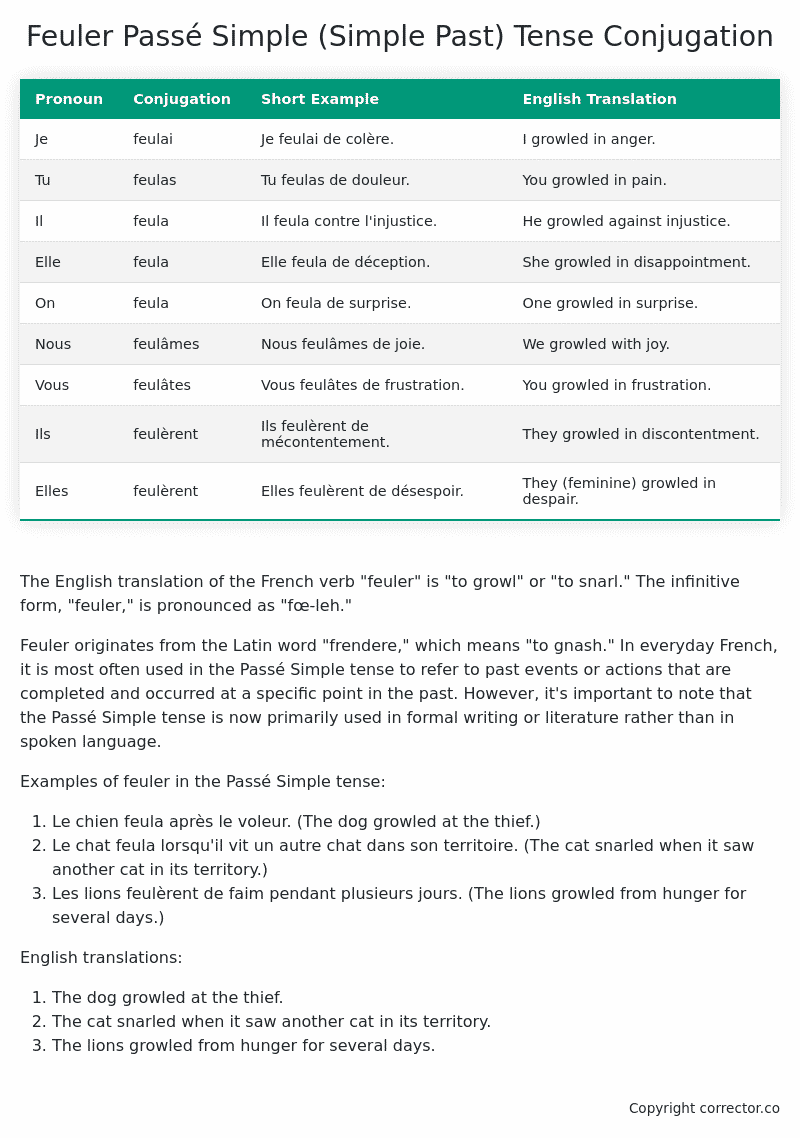Passé Simple (Simple Past) Tense Conjugation of the French Verb feuler
Introduction to the verb feuler
The English translation of the French verb “feuler” is “to growl” or “to snarl.” The infinitive form, “feuler,” is pronounced as “fœ-leh.”
Feuler originates from the Latin word “frendere,” which means “to gnash.” In everyday French, it is most often used in the Passé Simple tense to refer to past events or actions that are completed and occurred at a specific point in the past. However, it’s important to note that the Passé Simple tense is now primarily used in formal writing or literature rather than in spoken language.
Examples of feuler in the Passé Simple tense:
- Le chien feula après le voleur. (The dog growled at the thief.)
- Le chat feula lorsqu’il vit un autre chat dans son territoire. (The cat snarled when it saw another cat in its territory.)
- Les lions feulèrent de faim pendant plusieurs jours. (The lions growled from hunger for several days.)
English translations:
- The dog growled at the thief.
- The cat snarled when it saw another cat in its territory.
- The lions growled from hunger for several days.
Table of the Passé Simple (Simple Past) Tense Conjugation of feuler
| Pronoun | Conjugation | Short Example | English Translation |
|---|---|---|---|
| Je | feulai | Je feulai de colère. | I growled in anger. |
| Tu | feulas | Tu feulas de douleur. | You growled in pain. |
| Il | feula | Il feula contre l’injustice. | He growled against injustice. |
| Elle | feula | Elle feula de déception. | She growled in disappointment. |
| On | feula | On feula de surprise. | One growled in surprise. |
| Nous | feulâmes | Nous feulâmes de joie. | We growled with joy. |
| Vous | feulâtes | Vous feulâtes de frustration. | You growled in frustration. |
| Ils | feulèrent | Ils feulèrent de mécontentement. | They growled in discontentment. |
| Elles | feulèrent | Elles feulèrent de désespoir. | They (feminine) growled in despair. |
Other Conjugations for Feuler.
Le Present (Present Tense) Conjugation of the French Verb feuler
Imparfait (Imperfect) Tense Conjugation of the French Verb feuler
Passé Simple (Simple Past) Tense Conjugation of the French Verb feuler (You’re reading it right now!)
Passé Composé (Present Perfect) Tense Conjugation of the French Verb feuler
Futur Simple (Simple Future) Tense Conjugation of the French Verb feuler
Futur Proche (Near Future) Tense Conjugation of the French Verb feuler
Plus-que-parfait (Pluperfect) Tense Conjugation of the French Verb feuler
Passé Antérieur (Past Anterior) Tense Conjugation of the French Verb feuler
Futur Antérieur (Future Anterior) Tense Conjugation of the French Verb feuler
Subjonctif Présent (Subjunctive Present) Tense Conjugation of the French Verb feuler
Subjonctif Passé (Subjunctive Past) Tense Conjugation of the French Verb feuler
Subjonctif Imparfait (Subjunctive Imperfect) Tense Conjugation of the French Verb feuler
Subjonctif Plus-que-parfait (Subjunctive Pluperfect) Tense Conjugation of the French Verb feuler
Conditionnel Présent (Conditional Present) Tense Conjugation of the French Verb feuler
Conditionnel Passé (Conditional Past) Tense Conjugation of the French Verb feuler
Conditionnel Passé II (Conditional Past II) Tense Conjugation of the French Verb feuler
L’impératif Présent (Imperative Present) Tense Conjugation of the French Verb feuler
L’impératif Passé (Imperative Past) Tense Conjugation of the French Verb feuler
L’infinitif Présent (Infinitive Present) Tense Conjugation of the French Verb feuler
L’infinitif Passé (Infinitive Past) Tense Conjugation of the French Verb feuler
Le Participe Présent (Present Participle) Tense Conjugation of the French Verb feuler
Le Participe Passé (Past Participle) Tense Conjugation of the French Verb feuler
Struggling with French verbs or the language in general? Why not use our free French Grammar Checker – no registration required!
Get a FREE Download Study Sheet of this Conjugation 🔥
Simply right click the image below, click “save image” and get your free reference for the feuler Passé Simple tense conjugation!

Feuler – About the French Passé Simple (Simple Past) Tense
Formation
Usage
Narration
Historical Context
Interactions with other tenses
Passé Composé
Imparfait
Conditional and Subjunctive
Summary
I hope you enjoyed this article on the verb feuler. Still in a learning mood? Check out another TOTALLY random French verb conjugation!


